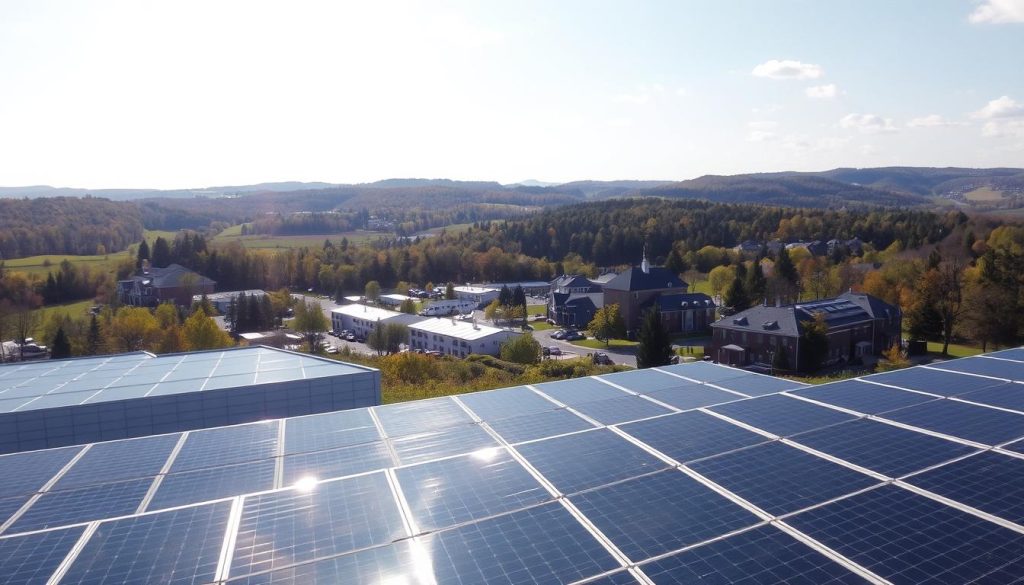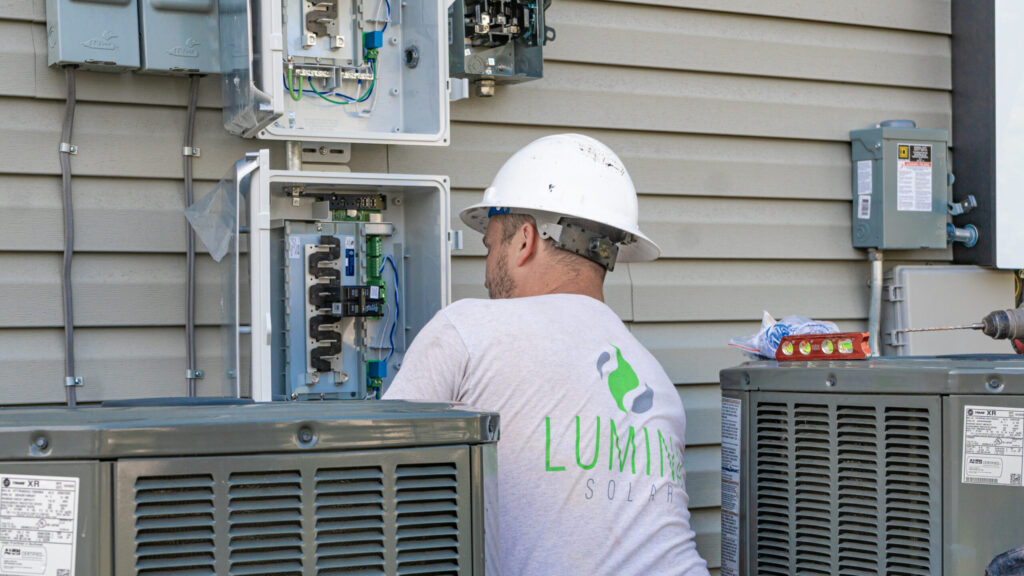Top Solar Energy Providers in Pennsylvania
Have you ever felt the weight of rising energy bills and wondered how you could make a positive impact on the environment at the same time? Imagine transforming your home into a beacon of sustainability while also easing your financial strain.
Contact Lumina Solar PA about Solar Energy Companies PA
Switching to green power energy is a smart move for homeowners in Pennsylvania. With rising electricity costs, investing in a solar panel system can help you save money while reducing your carbon footprint. But choosing the right provider is crucial to ensure a smooth and efficient installation process.

When selecting a solar company in Pennsylvania, it’s essential to consider factors like ratings, reviews, and expertise. Data from EnergySage shows that high-quality solar panel installation can significantly improve your home’s energy efficiency. This means more savings and a reliable source of power for years to come.
Understanding the importance of a well-designed solar panel system is key. From the initial setup to long-term performance, every detail matters. By focusing on trusted providers like Lumina Solar PA, you can ensure your investment pays off.
Overview of Solar Energy Solutions in Pennsylvania
Pennsylvania is becoming a hub for renewable power solutions. With a growing focus on sustainability, homeowners and businesses are exploring cleaner alternatives to traditional power sources. This shift is driven by both environmental concerns and financial incentives.
When choosing a solar company, it’s essential to evaluate their expertise and track record. Providers with strong credentials ensure a seamless installation process and long-term reliability. Look for companies with positive reviews and proven results.

One of the most attractive benefits is the solar tax credit. This incentive significantly reduces upfront costs, making it easier to invest in renewable power. Combined with state-specific programs, these credits enhance the appeal of switching to green power.
Pennsylvania’s commitment to renewable energy is evident in its green power initiatives. These policies encourage the adoption of cleaner solutions and align with broader environmental goals. By leveraging these programs, you can contribute to a more sustainable future.
As power energy management evolves, renewable solutions are becoming more accessible. Advances in technology and state support make it easier than ever to choose the best option for your needs. Whether for residential or commercial use, the benefits are clear.
Understanding Solar Panel Systems and Installation
The key to a successful renewable project lies in choosing the right team. A solar installer with expertise ensures your system is designed and installed to meet your needs. This process begins with a detailed evaluation of your property and energy usage.
Once the assessment is complete, the panel installation process starts. This includes mounting the panels, connecting the wiring, and setting up the inverter. Each step is crucial for optimal performance and long-term reliability.
Working with a reputable company in Pennsylvania ensures compliance with local regulations. Experienced providers handle permits, inspections, and interconnection seamlessly. This reduces delays and ensures your system is up and running quickly.
Data from EnergySage highlights the importance of professional solar energy setups. Systems installed by certified teams perform better and last longer. This translates to greater savings and a more sustainable home.
Choosing the right solar installer also means access to local incentives. Pennsylvania offers programs like SRECs and net metering, which enhance the financial benefits of your investment. These programs make renewable solutions even more attractive.
In summary, understanding the technical aspects of panel installation is essential. Partnering with a trusted company in Pennsylvania ensures a smooth process and maximizes your system’s potential. This approach guarantees long-term benefits for your home and the environment.
Evaluating Solar Company Credentials and Certifications
Credentials and certifications are critical when selecting a provider for your green power needs. A reputable installer ensures your system is designed and installed to the highest standards. This guarantees long-term performance and reliability.
Look for certifications like NABCEP, which indicate expertise in panel installation and system design. These credentials ensure the provider meets rigorous industry standards. They also reflect a commitment to quality and safety.
Warranty systems are another key factor. A trustworthy company typically offers a 10-year labor warranty and a 25-year warranty on panels. This protects your investment and ensures peace of mind.
Tax credits can significantly reduce your upfront costs. The federal tax credit allows you to deduct a percentage of your system expenses from your taxes. This makes renewable power more affordable and accessible.
When comparing providers, check customer reviews and industry awards. Companies with positive feedback and recognition are more likely to deliver quality service. This ensures a smooth installation process and optimal system performance.
In summary, evaluating credentials and certifications is essential. Choose a provider with NABCEP certification, strong warranties, and positive reviews. This approach ensures your panel system meets strict quality standards and delivers long-term benefits.
Exploring Net Metering and Tax Incentives
Understanding how net metering works can maximize your savings and efficiency. In Pennsylvania, this policy allows you to sell excess power back to the grid. Credits earned during sunny months can offset higher bills in winter, making it a smart financial move.
Multi-year warranties are another key benefit. They protect your investment by ensuring your panel system remains reliable for decades. A good installer will offer warranties that cover both labor and equipment, giving you peace of mind.
Tax incentives further enhance the appeal of renewable power. The federal tax credit allows you to deduct 30% of your installation costs. Pennsylvania also offers programs like SRECs, which let you earn money for every 1,000 kWh your system generates.
These financial incentives make renewable power more accessible. By combining net metering, warranties, and tax credits, you can enjoy long-term savings and a reliable panel system. It’s a win-win for your wallet and the environment.
Key Factors for Solar Panel Quality and Warranty
Ensuring the quality of your system starts with understanding its components. A high-performing setup relies on verified installation methods and durable materials. This ensures your investment delivers long-term benefits.
Technical specifications play a crucial role in determining efficiency. Look for panels with a proven track record of performance. Reputable providers often offer detailed data on energy output and durability.
Warranty details are a strong indicator of a company’s confidence in their products. Most systems come with a 25-year performance guarantee, ensuring at least 80% efficiency over time. This protects your investment and provides peace of mind.
Customer satisfaction is another key factor. Trustworthy providers prioritize clear communication and reliable service. Positive reviews and testimonials can help you gauge their commitment to quality.
Regular maintenance is essential for maximum performance. Professional installation ensures your system is set up correctly from the start. This minimizes issues and extends the lifespan of your setup.
In summary, focus on verified methods, durable materials, and strong warranties. These factors ensure your system remains efficient and reliable for years to come. Choose a provider that prioritizes quality and customer trust.
Choosing the Right Solar Energy Companies PA
Finding the right provider for your renewable needs in Pennsylvania requires careful consideration. With so many options available, it’s essential to focus on key factors that ensure a seamless experience and long-term benefits for your home.
Start by evaluating the local market reputation of providers. Companies with strong reviews and a proven track record are more likely to deliver quality service. For example, IntegrateSun and Green Power Energy are highly rated in the state, making them reliable choices.
Understanding financing options is another critical step. Whether you choose solar loans, leases, or Power Purchase Agreements (PPAs), each option has unique benefits. Tailored solutions can make your investment more affordable and align with your financial goals.
Pennsylvania offers specific incentives like SRECs and net metering, which enhance the appeal of renewable solutions. These state programs not only reduce upfront costs but also provide long-term savings. Leveraging these incentives ensures your home benefits from maximum efficiency.
Finally, consider the experience and expertise of the installer. Providers with certifications like NABCEP ensure your system is designed and installed to the highest standards. This guarantees optimal performance and reliability for years to come.
By focusing on these criteria, you can confidently choose a provider that meets your needs. A well-selected installer ensures your home enjoys the benefits of renewable power while contributing to a more sustainable future.
Comparative Insights: Local Versus National Solar Installers
When deciding between local and national providers, understanding their differences can guide your choice. Local installers often offer personalized service, tailored to your specific needs. They are deeply familiar with regional policies and incentives, making the process smoother.
National providers, on the other hand, bring scale and resources. They may offer lower costs due to bulk purchasing power. However, their standardized processes might lack the flexibility of local experts.
One key advantage of local installers is their responsiveness. They are often more accessible for follow-ups and maintenance. This ensures your system remains efficient over time.
State-specific incentives are another area where local providers excel. They are well-versed in programs like SRECs and net metering, which can maximize your savings. National companies might not have the same level of expertise in these areas.
Ultimately, the best option depends on your priorities. If personalized service and local knowledge matter most, a local installer is ideal. For those focused on cost efficiency and brand reputation, a national provider might be the better choice.
By weighing these factors, you can make an informed decision that aligns with your goals. Whether local or national, the right installer ensures your investment delivers long-term benefits.
Financing Options and Investment Benefits for Solar Installations
Investing in renewable power has never been more accessible, thanks to flexible financing options. Whether you’re looking to purchase outright or explore alternative models, there’s a solution to fit your budget and goals.
One popular choice is a solar loan, which allows you to spread the cost over time. With competitive interest rates, this option makes it easier to manage upfront expenses. Another option is a Power Purchase Agreement (PPA), where you pay for the power generated rather than the system itself.
The federal solar tax credit is a game-changer for many homeowners. It lets you deduct 30% of your installation costs from your taxes, significantly reducing your net investment. Combined with state-specific incentives, this credit makes renewable power even more affordable.
Choosing the right financing plan is crucial for long-term benefits. A well-structured loan or PPA can help you save on monthly bills while increasing your property value. It’s a smart way to invest in your home and the environment.
By comparing financing options, you can find the best fit for your needs. Whether you prioritize low upfront costs or long-term savings, there’s a plan that works for you. Start exploring today and take the first step toward a more sustainable future.
Installation Considerations for Residential and Commercial Projects
Planning a renewable project requires understanding the unique needs of residential and commercial setups. The scale and purpose of your installation directly influence the process, timeline, and overall cost solar metrics. By tailoring your approach, you can ensure optimal results for your specific project.
For homeowners, the focus is often on reducing the monthly electric bill and maximizing long-term savings. Residential installations typically involve smaller systems designed to meet household energy needs. Quality is critical here, as a well-installed system ensures efficiency and durability.
Commercial projects, on the other hand, require a more robust approach. These installations often involve larger systems to meet higher energy demands. Understanding state and local requirements is essential, as compliance ensures a smooth process and eligibility for tax incentives like the federal ITC.
When planning your project, consider the timeline and potential disruptions. Residential installations are usually quicker, while commercial projects may take longer due to their complexity. Partnering with experienced installers ensures high quality and adherence to all regulations.
By focusing on these factors, you can make informed decisions that align with your goals. Whether for a home or business, a well-planned installation delivers long-term benefits and maximizes your investment.
Navigating Local Regulations and Installation Factors
Navigating local regulations is a critical step in ensuring a smooth installation process. Each region has unique codes and permits that directly impact your project. Understanding these rules can save you time, money, and potential headaches.
Local regulations often dictate where and how you can set up your system. Zoning laws, setback requirements, and height restrictions are common factors. These rules ensure your setup is safe and compliant with community standards.
The permitting process is another key aspect. You’ll need to submit detailed plans for approval before starting. This includes site layouts, structural designs, and electrical schematics. Working with experienced installers can streamline this step.
Utility approvals are also essential. Your system must meet specific standards to connect to the grid. This ensures your electricity setup is efficient and reliable. Early engagement with utility companies can prevent delays.
By understanding these factors, you can approach your project with confidence. Compliance with local regulations not only protects your investment but also ensures long-term success. Take the time to research and plan for a hassle-free experience.
Conclusion
Making the switch to a cleaner power source is a decision that pays off in multiple ways. From reducing your monthly bills to gaining greater independence, the benefits are clear. Programs like the federal solar tax credit make it easier to invest, offering significant upfront savings.
Choosing the right provider ensures a smooth process and long-term reliability. With trusted partners like Lumina Solar PA, you can confidently take the next step. Their expertise and commitment to quality make them a top choice for homeowners.
By leveraging available incentives and focusing on quality, you can maximize your savings and enjoy a more sustainable lifestyle. Start your journey today and experience the advantages of solar power with a team you can trust.




